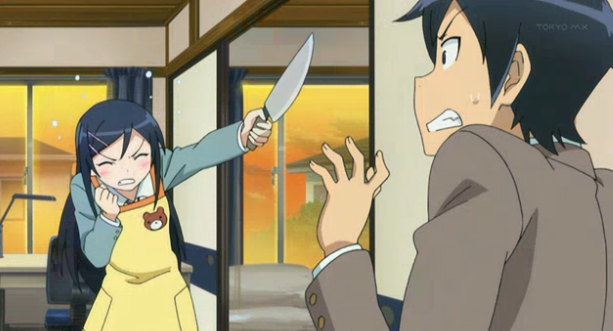Don’t get me wrong, I think fans are the most creative, inspiring people on Earth.
Fandom, on the other hand, sometimes just plain sucks.
When you saw this title, maybe you thought, “Looks like Lauren’s going to write about the drama-ridden X fandom.” But really, you could fill in that X with so many examples. Fandom wars and witch hunts aren’t just common, they’re basically a meme.
Fandom can bring us together to collaborate and create, but it can also bring out our most clannish tendencies and cruelest exclusionary behavior.
This is by no means a new idea. I browsed the “fandom sucks” tag on Tumblr and found a lot of fans who’ve got a bone to pick with fandom. Like this bisexual fan who is tired of being told queer characters don’t make sense, even in her fanfiction:
So you see, fandom, it comes to this: You are supposed to be a safe place. You are supposed to the oasis for all of the mismatched, marginalized, lonely nerd kids out there. But you aren’t. Not always, and not consistently, not for people like me.
Or this desperate plea from a Homestuck/hotel employee, reasoning with convention attendees to exhibit basic hotel etiquette like paying for the room with real money:
Please don’t stand in the lobby and cry or try to offer me ‘free art commissions’ or the horns off your Homestuck costume. My hotel does not accept those as payment.
Here’s the latest scandal in brony fandom, that’s just a lose-lose. First, a fan began impersonating another brony fan creator. That’s bad enough. Now though, bronies are looking for her, crying for blood—and the creator isn’t discouraging them. There’s a lot wrong here, from the girl taking advantage of fandom enthusiasm to take credit for somebody else’s idea, to the vigilante backlash that’s quickly getting out of hand.
These are just everyday rants, but there are also institutionalized examples. Take gamer fandom, always an easy target. Video game fandom has a big problem with misogyny, or so it appears, since every time a disparate voice pipes up it is quickly silenced in an avalanche of angry comments.
In reality, the fandom as a whole is OK with women (and about 48 percent of us ARE women). But the mob mentality of fandom distorts opinion. For example, the sexism Anita Sarkeesian faced likely became so consistent and standard because vocal misogynist fans believed that their opinions were in the majority.
A fandom can be like a political party or an organized religion. At its best, it’s a group of people united for their ideals. At its worst, it’s unbearable, a joke. It can motivate us to create our best work or to fight for a cause. Or it can give us an excuse to partake in close-minded beliefs or inappropriate behavior because “everybody’s doing it.”
I started writing this rant after working on a blog post called, “Why fandom rocks,” but it seemed so obvious. If fandom wasn’t mostly good, we wouldn’t be in it in the first place. For many of us, fandom was the first place we ever felt accepted or valued. But that doesn’t mean it doesn’t still have problems.
What can we fans do to fix institutional problems in fandom?
(Screenshot of Ayase from Oreimo 2 demonstrating inappropriate convention behavior.)

7 Comments.
You’re going to have to get rid of cognitive bias, which can be extremely difficult to remove.
One way to combat this is by raising people’s empathy about things. I think there’s not enough empathy going around in this world.
http://io9.com/how-could-we-engineer-humans-to-have-more-empathy-514480050
That’s a fascinating article! It’s amazing how we as a species have such a broad spectrum of empathy levels.
It is. I’ve been disappointed at fandom sometimes myself, but yet, the good sometimes doesn’t get noticed enough. It’s usually the bad and the bad is portrayed as the norm.
Tony, maybe you should write a reply post, “Why Fandom Rocks,” and point out that I’m being too hard on fandom! I’d read it.
That article really shed some light for me on non-empathic behavior online. However, a lot of this analysis is based on research about people that are face to face with each other. When you’re online, how will empathy play a role when you have nothing to go on but words, context (or lack thereof), and your best guess?
By the way, nice blog, Lauren. :)
No easy fix suggests itself, in part because we’re dealing with behaviors that are both emergent (a property of the environment they come from) and institutional (they’re at least partly expected of those environments by the very people in them). But the article cited above has a few hints about that.
The best way is to encourage better fans, and that means having creators stand up and say “If you’re going to bat for me like this, I don’t want you as a fan.”
Great article.
I have one little criticism however (the rest was fantastic), on your reference to Anita Sarkeesian and the video game community relevant. Sarkeesian was met with mysogynist comments as a result of being trolled, not of angering mysogynist viewers. This trolling occurred due to Sarkeesian’s arguments being flawed in multiple ways, her research inconsistent and her conclusions heavily biased. While I do not not condone the childish trolling many resorted to, I do not condone such a reference to her as an example here either. But of course, this is but a tiny nitpick.
I’d suggest you watch this well made video if you wish to enlighten yourself on Sarkeesian (part one of multiple, I believe, if I recall correctly, three):
http://m.youtube.com/#/watch?v=QJeX6F-Q63I&desktop_uri=%2Fwatch%3Fv%3DQJeX6F-Q63I
(Sorry for the link being in the above state, but since I am writing this from an iDevice, it’s quite difficult to get things right for me)
Thanks for the read.